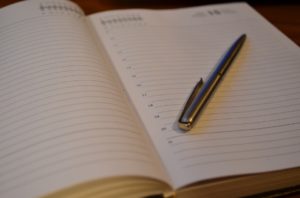
When was the last time you had a day when everything was perfect?
When whatever you set your mind to just seemed to take care of itself?
I’ve had days like that. I remember one where I seemed to be in sync with everything: getting out of bed, brushing my teeth, my clothes felt just right and looked good, the coffee was great, my energy was high and I was in plenty of time for my first appointment. My client presentation went well, the client enthusiastically accepted my proposal and wrote me a cheque on the spot. Just about perfect!
Not every day was like that though – some days I was completely disorganized, got in a rush and then confusion. Panic took over and my presentations sucked.

So what’s the difference, you may ask? When I compared the two days I realized that on the good day I had taken the time the night before to choose and lay out my clothes, the coffee was loaded and just needed a button pushed, I actually had time to brush my teeth, and I had reviewed my client proposal to make sure there were no mistakes.
None of this happened on my bad day. My actions had no order, my mind was in turmoil, I burnt my tongue on my coffee, and my unease became obvious to my client. Not exactly the most confidence building start to a negotiation.
What makes the difference?
 Outside of feeling good on my good day, it was all about the routine and planning ahead. By spending a few minutes the night before to visualize the morning routine and making a checklist of what needed to happen, life became easy to navigate.
Outside of feeling good on my good day, it was all about the routine and planning ahead. By spending a few minutes the night before to visualize the morning routine and making a checklist of what needed to happen, life became easy to navigate.
And, it wasn’t hard! All I gave up was a few minutes of casual downtime that I wouldn’t even miss. The greatest benefit wasn’t that my day unfolded with ease but rather that I felt so good about being prepared and organized. What a revelation!
These were lessons from my previous career, out in the world of self employment.
Now, as Clear Sky’s Operations Manager, when I’m tempted to kick back prematurely in the evening I take a moment to reflect and follow a few simple steps:
1. I set my goal for the next morning,
2. estimate the time required to reach that goal, and then
3. work backward, allowing for all the little morning actions to follow one another naturally and calmly.
Life has become much more manageable and satisfying since I adopted this practice. Other people seem to like being around me more and I’m sure having more fun!
Clearly, I’ve discovered structure and routine not to be tedious chores to be avoided in my “retirement,” but rather very good friends that never let me down.
Try this exercise
Think of an area of your life you’d like to be working better. How would bringing in more structure or routine help?
Feel free to comment below.


